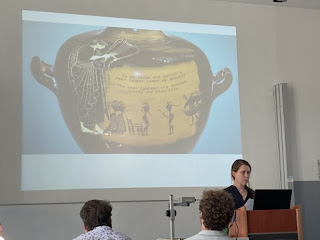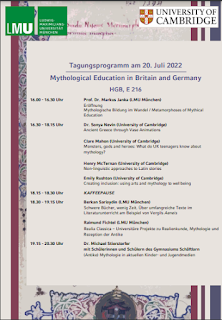We are delighted to share our new documentary with you: About Iris – Rainbow Goddess. This mini doc is a companion piece for the Iris animation. Both can be found on the Iris webpage, and they’re shared here for your convenience too:
These videos were made as part of the project Our Mythical Childhood… The Reception of Classical Antiquity in Children’s and Young Adults’ Culture in Response to Regional and Global Challenges. The project was generously funded by the European Research Council (a wing of the EU), and headed by Professor Katarzyna Marciniak of the University of Warsaw.
For the last year or so, we have been busy preparing a publication to complement the Our Mythical Childhood animations. Teaching Ancient Greece: Lesson Plans, Animations, and Resources is a collection of lesson plans based around the five Our Mythical Childhood animations. They have been prepared by experienced teachers from all over the world. Every lesson plan contains guidance for delivering a class and an interesting and challenging activity. The lesson plans have been brought together with further resources to support teaching about antiquity, including materials about pottery and resources for making your own animations. The Iris section contains lesson plans by Kay Brown in New Zealand, taking a cross-cultural look at mythology, and by Dean Nevin in Switzerland, introducing a messenger themed writing challenge for younger children. As a bonus, Teaching Ancient Greece will be available as an Open Access publication, meaning that it can be downloaded for free. A hard copy will be available to purchase for those who love a physical book! We’ll have more news for you as the publication date approaches.
Above, a screenshot from 'About Iris', also found in 'Teaching Ancient Greece' in a section on Iris in 'The Iliad'.
In other news… a throwback to earlier in the summer. We took a trip to Ludwig Maximillian University of Munich, in southern Germany. The conference Mythological Education in Britain and Germany was part of the University of Cambridge-Ludwig Maximilian Strategic Partnership: an opportunity to visit each other’s universities and share good practice in Classics teaching and teacher training. Here are some images of the event:
Above, Panoply’s Sonya Nevin talking about using vase animations in the classroom.
Above, Emily Rushton describes ways of making Classics more inclusive, particularly for those who are neurodivergent.
Above, Lisa Hay from the Cambridge Schools’ Classics Project discusses the much-celebrated revamp of the Cambridge Latin Course.
Above, Our host, LMU's Markus Janka, presents the varied tradition of Ovid in education.
Above, Markus and his colleagues have published this Latin translation of Suzanne Collins’ 'Hunger Games' (complete with a Latin-German vocab guide).
Above, Raimund Fichtel describes the Classics teacher training programme at LMU and the top-up days which teachers from across Bavaria can attend at the university to keep them up-to-date with research and to share ideas and approaches.
Above, Berkan Sariaydin on the tradition of Virgil’s 'Aeneid' within education.
Above, pupils from the Gymnasium Schäftlarn near Munich, with their Latin teacher Michael Stierstorfer. The students gave excellent presentations on their research projects into various classical reception topics.
Above, the programme for Mythological Education in Britain and Germany.
We also had the opportunity to visit Wilhelmsgymnasium, a secondary school in Munich with a fine tradition of teaching Latin and Classical Civilisation. Many thanks to everyone who made us so welcome and let us crash the classes! And a big thank-you to everyone at Ludwig Maximilian and at Cambridge's Faculty of Education for bringing it all together.
Munich is sometimes called the most northerly Italian city - for its great tradition of Classics and neoclassicism. A trip there wouldn't be complete without a visit to the city’s superb museums, so Steve and I had a very enjoyable trip to the Staatliche Antikensammlungen, which holds Bavaria's extensive collections of antiquities from Greece, Etruria and Rome. Many thanks to curator Astrid Fendt for showing us around. We will have more news about our experiences with the Munich collections in due course…
Finally, above, a scene of vase-making from the magnificent collection at the Staatliche Antikensammlungen.












No comments:
Post a Comment